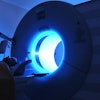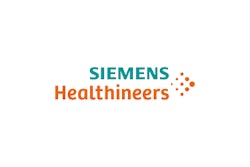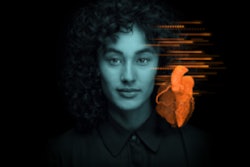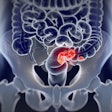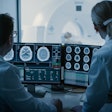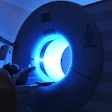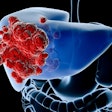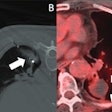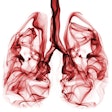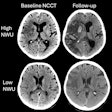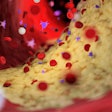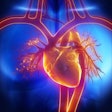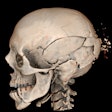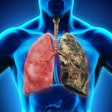If you aren't up to speed yet on photon-counting CT, you certainly will have a great opportunity to get there at the next week's RSNA meeting.
Ever since the U.S. Food and Drug Administration (FDA) cleared Siemens Healthineers' Naeotom Alpha device in September 2021, radiology has been abuzz with discussion about what the technique can offer compared to conventional CT -- especially since the agency called photon-counting CT the "first major imaging device advancement in CT in nearly a decade."
What's so great about it? Advocates highlight the technology's ability to produce images at a higher resolution but a lower radiation dose through a process in which x-rays are converted directly to electrons, rather than conventional CT's two-step method, which consists of first converting x-rays to light and then to an electronic signal. Over the course of this year, researchers have touted photon-counting CT's versatility, demonstrating that it performs well with everything from visualizing multiple myeloma and cerebrospinal fluid venous fistula better than conventional CT to helping to better diagnose interstitial pneumonia.
Research to be presented at the RSNA meeting will continue this lively conversation about the technology's benefits in sessions that highlight its knack for improving perfusion imaging on chest CT angiography exams, boosting the image quality of pediatric chest imaging, and enhancing breast cancer studies. The RSNA will also be offering a number of primers on the technology, including a Sunday morning session that will give attendees an overview of how it works and why it's great.
Research about photon-counting CT may dominate at the RSNA meeting, but there will be many other studies that highlight CT's contributions to healthcare, including what CT findings a year post COVID-19 can show about patients' lung health, how whole-body CT can help identify multiple myeloma lesions and track patient response to CAR-T Cell therapy, and how artificial intelligence (AI) makes low-dose chest CT even more efficient when it comes to reducing radiation dose.
CT is a proverbial workhorse in the radiology department, in part because it is such a versatile modality. To get a sense of what to expect regarding CT at the meeting, take a look at the scientific abstracts we're highlighting as part of our premeeting coverage. You can also peruse the complete RSNA 2022 meeting program, which outlines the scientific, educational, and training sessions the society will have on offer.
CT shows lingering COVID-19 effects more than a year after infection
Sunday, November 27 | 9:00 a.m.-10:00 a.m. | S1-SSCH01-5 | Room E351
The effects of COVID-19 on patients' lungs are evident on CT, even a year after initial infection, according to this Sunday morning presentation.
AI algorithm identifies multiple myeloma lesions on whole-body CT
Sunday, November 27 | 9:00 a.m.-10:00 a.m. | S1-SSMK01-2 | Room E451B
Researchers from the Mayo Clinic in Rochester, MN, will share how their deep-learning algorithm can detect multiple myeloma lesions on whole-body CT exams.
CT tracks patient response to CAR T-cell therapy
Sunday, November 27 | 10:30 a.m.-11:30 a.m. | S2-SSNMMI01-3 | Room E352
In this session, German researchers will discuss how CT can help clinicians track patient response to chimeric antigen receptor (CAR) T-cell therapy for diffuse large B-cell lymphoma.
Dual-energy conebeam CT enhances brain image quality
Sunday, November 27 | 10:30 a.m.-11:30 a.m. | S2-SSPH02-4 | Room N229
Dual-energy conebeam CT (DECT) yields higher brain image quality than single-energy conebeam CT in patients presenting with ischemic or hemorrhagic stroke, a Swedish researcher will report during this Sunday session.
Photon-counting CT improves perfusion imaging, reduces radiation dose
Sunday, November 27 | 11:45 a.m.-12:15 p.m. | S3A-SPCH-4 | Learning Center -- CH DPS
Using photon-counting technology (PCCT) with chest CT angiographic exams shows promise for improving perfusion imaging while maintaining image quality -- and slashes radiation dose by 50%, French investigators have found.
How does photon-counting CT perform for diagnosing interstitial lung disease?
Sunday, November 27 | 1:30 p.m.-2:00 p.m. | S4-STCE-2 | Learning Center Theater
Photon-counting CT could be a useful tool for early diagnosis of interstitial lung disease -- although it does impart more radiation than conventional high-resolution CT, according to research results to be shared in a Sunday afternoon poster session.
AI algorithm aids in staging of liver fibrosis on CT exams
Sunday, November 27 | 2:30 p.m.-3:30 p.m. | S5-SSGI03-4 | Room S406B
An artificial intelligence (AI) algorithm can yield highly accurate performance for staging liver fibrosis on CT exams, according to this scientific presentation.
Photon-counting CT boosts image quality of pediatric chest studies
Monday, November 28 | 10:00 a.m.-10:30 a.m. | M3-STCE-3 | Learning Center Theater
Photon-counting CT could improve the image quality of pediatric chest exams compared with conventional CT -- without increasing radiation dose, a group from Duke University in Durham, NC, has found.
Is CT utilization in the emergency department appropriate?
Tuesday, November 29 | 9:30 a.m.-10:30 a.m. | T3-SSNPM02-4 | Room E352
Is utilization of CT -- as well as MRI and ultrasound -- appropriate in the emergency department? It could be better, Stanford researchers say.
How good is photon-counting CT in breast imaging?
Tuesday, November 29 | 9:30 a.m.-10:30 a.m. | T3-SSPH07-4 | Room S402
In this session, photon-counting CT's potential in breast imaging will be discussed, with research suggesting it has similar image quality to dedicated breast CT.
Do iodine maps on DECT help in predicting COVID-19 outcomes?
Thursday, December 1 | 12:15 p.m.-12:45 p.m. | R5A-SPCH-5 | Learning Center -- CH DPS
In this Thursday afternoon poster session, University of Pennsylvania researchers will describe how visual CT severity scores beat dual-energy CT (DECT) iodine maps for predicting overall survival in patients with COVID-19 and acute pulmonary embolism.
AI takes low-dose chest CT dose even lower
Thursday, December 1 | 1:30 p.m.-2:30 p.m. | R6-SSCH10-2 | Room N228
Researchers have found that deep learning-based reconstruction can enable low-dose chest CT images to be reconstructed with a 75% lower radiation dose without negatively impacting image quality and lesion detection.




